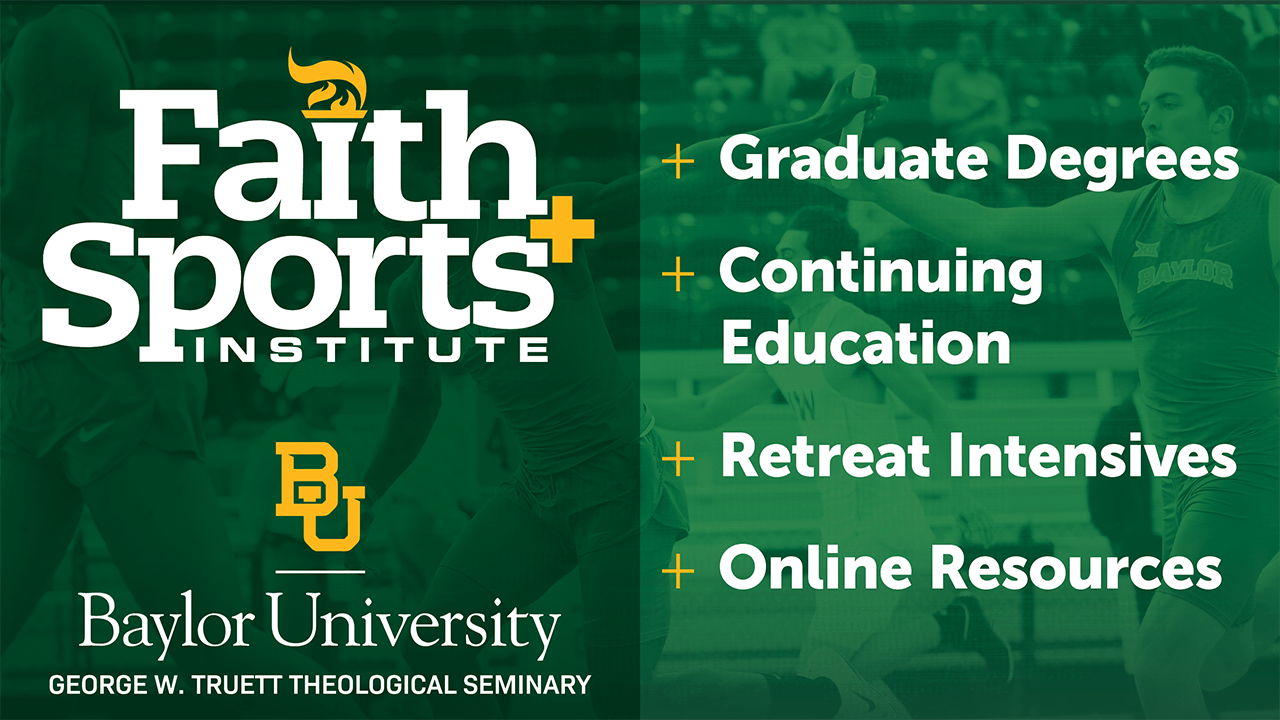Austin Hallman
Earlier this year I had the pleasure of interviewing coaches, athletic directors, and administrators at various Christian institutions around the country. The conversations were part of my role with the “Preparing Champions” grant received by the Faith & Sports Institute and Baylor Athletics. My purpose: learning how these leaders thought about and navigated character formation in a distinctly Christian way in a rapidly shifting era of college sports.
While every school, department, and coach was unique in some ways, there were also common threads that offer helpful insight for any Christian attempting to faithfully disciple young athletes into men and women who think, act, and love more like Jesus. I’ve distilled my main takeaways into five main points.
- Doing something is better than doing nothing.
A common struggle I heard from interviewees, regardless of their role, was getting student athletes to show up to things that are not required. There was a hesitation to add more to already busy schedules, or to try a new faith-centered initiative when it might not have widespread attendance.
I know this struggle is real. Yet if you are in this boat, you should feel encouraged. It was amazing to hear testimonies from school after school of athletes who had shown up reluctantly to a worship night, Bible study, or missions trip and had their life transformed by the power of the gospel.
Intentionality matters. Christlike character is not formed by accident. Every little moment and effort has eternal value and aids toward the development of Christian character. This is increasingly true at the higher levels of the NCAA, where athletes may only be at a school for six months before transferring. Even the most seemingly inconsequential prayer, Bible study, or conversation can plant seeds of opportunity that might sprout and grow in unexpected ways.
- Having the right people is more important than having the right programming or strategy.
Winning the character formation battle starts with having the right staff in place. One AD noted that in a department with forty people, missing the mark on just three or four hires means that ten percent of the department is not on the same page. Another AD noted that all formation occurs in community, especially among our peers, and that character formation is inherently relational. Whether that is one’s relationship with God, one’s coach, one’s teammates, or one’s colleagues, we tend to become more like those we are around.
The role of the leader can be overemphasized at times in athletics. One AD noted that he wants his athletes to learn how to follow as well as lead. But in general, a leader with strong Christian character sets the structure and foundation for spiritual formation within a department or team. Think about the nations of Israel and Judah in the Old Testament. While God was faithful to always preserve a remnant for Himself, the nation tended to go as the king went. Faithful king, faithful nation. Unfaithful king, unfaithful nation. Or think of the New Testament, where the Apostle Paul urged the Corinthians to follow his example as he followed Christ.
Whether it is a head coach or an AD, it is paramount to have people who love the Lord and are committed to Christian character formation, otherwise even the most faithful of athletes will be fighting an uphill battle.
- Unity matters, especially regarding clear and consistent messaging throughout the student-athlete’s college experience.
College coaches and administrators are pressed for time, especially those in the NCAA who are under time restrictions with their athletes. It is crucial for them to understand how to best utilize the resources at their disposal. Perhaps no resource is more important than those present already on campus, including counseling and spiritual life offices. The athletic departments that were effectively integrated into the life and mission of their institutions were able to more effectively form their athletes. If an athlete is getting similar messages and language from their coaches, AD, trainer, campus pastor, and professors, they are in a much better position to continue developing into mature adults and, hopefully, disciples of Jesus.
In addition, the athletic departments that had a clear vision of what they wanted to see happen in their athletes seemed to have more complete buy-in from members of the department. There were numerous stories of the impact an assistant coach or a trainer had on an athlete, as well as the effects of three or four years of being in an environment of honor and love. This allowed the athletes to get a vision of what kingdom life looks like—and an invitation to try it out for themselves.
- A Christian name is not enough to resist the transactional culture of college sports.
Many of the interviewees lamented that at times and to varying degrees, they felt that their departments relied more on their reputation and Christian name than putting in the hard work to develop the character of Christ in their athletes.
One AD pointed out the false idol of winning and success as the main driver away from true Christian formation, with money being a potentially distracting motivating factor. As he watched his institution function more from a transactional model, especially in recruiting, his institution decided something needed to be done. They made the bold decision to move to a lower NCAA division, removing athletic scholarships from the equation, with a primary goal of getting back to Christian character formation as the heart of their department.
Another administrator in charge of student-athlete formation at a mid-sized Division 1 school discussed the difficulty of being transformational when the entire system is built to be transactional. This is increasingly true when it comes to ongoing developments with NIL and the transfer portal. While one does not have to be quite so bold as to change divisions—in fact, here at Baylor, we believe strongly that Christians should be present and engaged at the highest levels of college competition while pursuing authentic Christian formation—it is clear that Christian athletic departments and teams must find ways to boldly go against the grain.
- Creativity and learning from others are essential to doing Christian character formation well.
There is no one right answer to Christian character formation. There is no single institution that has it figured out to perfection. Every athletic department is unique, with differences in the giftings, backgrounds, experiences, and expectations of both the student-athletes and staff. And those differences can be a strength if leaders in Christian higher education can learn from one another.
It was amazing hearing about the variety of ways athletic departments dreamed with God to create spaces for athletes to encounter Christ and to be formed into His image.
For example:
- One Division III school turned their entire strength and conditioning program into a spiritual development curriculum, which the strength coaches take every athlete through each year.
- One mid-major Division 1 school created and implemented spiritual formation weeks that its student-athletes go through at the start of each semester.
- One NAIA school holds Sportsmanship Character Summits throughout the year for local high school students, helping to connect the athletic department and college athletes with the community at large.
- Many schools took their athletes on missions trips, with all reporting that these are some of the most powerful and transformative experiences for those involved.
One AD put it like this: “The better we all are, the better we all are.” The big goal is to build God’s kingdom. Christian athletic departments need each other, and the more we develop and share good ideas, the better it will be for all of us who care about Christian character formation.
I’m thankful that from my conversations I was able to get a small glimpse of the many ways Christian leaders are quietly and faithfully serving, developing, and forming student-athletes in and through college sports.
About the author: Austin Hallman recently graduated from Truett Seminary with his Master of Arts in Christian Ministry. During his time at Truett he served as a graduate assistant and research assistant for FSI.





